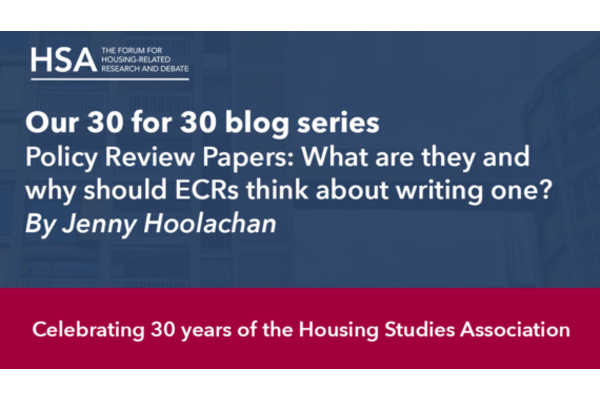
Policy Review Papers: What are they and why should ECRs think about writing one?
Dr Jenny Hoolachan is a Lecturer at Cardiff University with research interests in homelessness, the private rental sector, home, precarity, substance use and young people’s experiences. She is the Treasurer for the Housing Studies Association and is the Policy Review Editor for the International Journal of Housing Policy.
Parts of this blog have already been published on the IJHP website here.
Policy reviews are excellent spaces to provide a short, sharp critical analysis of a policy development. Critically tracing the impacts of a policy (or series of policies) or the processes, politics, ideologies and discourses that have culminated in a policy, provides crucial insights into how different nations, regions and cities tackle housing-related challenges. Many esteemed housing scholars publish policy reviews throughout their careers – indeed, if you scroll through any housing journal you will certainly recognise some ‘big’ names in the policy review section.
In this blog, I explain what a policy review paper is, some ‘dos and don’ts’ and I argue that early-career researchers (ECRs) should consider writing this type of paper; they’re not just for the ‘big’ names! In the spirit of transparency, I write this blog from the position of being the Policy Review Editor for the International Journal of Housing Policy (IJHP) meaning much of the advice below is tailored to this journal. However, several other housing-related journals (e.g. Housing Studies, Critical Social Policy and Urban Studies) also publish policy reviews and critical commentaries.
What is a Policy Review?
When I commenced my academic career, I had never consciously engaged with policy reviews. In the early days of my PhD, I was unaware that some journals, including the IJHP, have a distinct ‘policy review’ section in the same way as they have a ‘book review’ section. As my career developed and some of my research became more explicitly policy-focused, I began to pay more attention to policy reviews and to understand their value. Full disclosure – I have yet to publish my own policy review paper (although it is on the cards) but having been the Policy Review Editor for the IJHP for nearly 2 years I have gained insight into what they are, how to write them, and what not to do.
A policy review is a short paper which examines a single policy or a series of policies which are, in our case, related to housing. It might focus on a particular country, city or region, it could involve a comparative analysis across different nations, or it might examine a general policy issue which is not specific to a geographical area. Crucially, a policy review is not simply a description of a policy development. Rather, it is important for the paper to have a core critical argument which is based on some form of analysis. Just like any other type of paper published in journals, policy reviews need to make an original contribution to the field of housing which goes beyond a descriptive account.
To give you an idea, some recent policy reviews published in the IJHP include two different analyses of the Dutch housing context (which can be read here and here), an analysis of a Housing First initiative in Australia, the Renting Home (Wales) Act 2016, microfinance in Latin America and the effects of local housing allowance reductions on overcrowding in the English PRS. In the third issue of 2021, Xiao Ma – a PhD candidate at the University of Sydney – has authored a paper on foreign real estate investment in the context of China and Australia.
Policy reviews may or may not contain primary data. In the absence of primary data, they might revolve around the analysis of secondary data, policy documents, discourse, political or legal documents, or involve a systematic review (this is not an exhaustive list). They are typically much shorter than research articles (the maximum word limit for IJHP policy reviews is 4000 words) and they revolve around one or two core arguments which are based on careful analysis. Because they are short, it is crucial that policy reviews are written succinctly and contain a clearly defined point.
Given that policies are typically specific to a country, city or region, one way of thinking about a policy review paper is that it involves a case study of a particular geographical, political, economic and social context. Therefore, policy reviews offer an opportunity to discuss the ‘nitty gritty’ detail aligned to the case. However, since journals have an international reach, it is important to situate the case study within an international context. For example, when writing, I always ask myself – why should someone in Australia or Brazil or Japan care about homelessness or private rental policy in Scotland or Wales? It is, of course, impossible to make a connection between your case study and every single other country in the world, but it is always possible to identify key pieces of work from other countries which have something in common with your own. Once you have identified these, you can ‘top and tail’ your policy review paper by discussing some of these international connections in the introduction and conclusion. Where relevant, you may also refer to these other contexts in the main body of the paper, but ‘topping and tailing’ is the minimum you should aim for.
Dos and Don’ts for Policy Reviews
As an editor for the IJHP, the most common issues we see with policy reviews when they are first submitted are: exceeding the word limit; poor English-language expression; not situating the case study within the international literature; not having a clear focus; being overly descriptive; and not sufficiently engaging with academic literature. Taking the time prior to submission to ensure your policy review avoids these pitfalls will increase the likelihood of it progressing to peer review and, hopefully, publication.
Not exceeding the word limit, ensuring your work is proofread and that English-language expression is comprehensible may seem straightforward but they are important ‘rules’ to follow when writing a policy review. Situating your case study within the international literature is also crucial, especially when submitting to a journal like the IJHP. Below, I pick up on some of the other ‘dos’ in a little more detail:
Ensure there is a clear and logical argument being made throughout the paper. Sometimes authors try to pack in too many arguments. The tight word limit can result in the arguments becoming cluttered or underdeveloped. A strong policy review has one or two core messages which are rigorously developed through the analysis.
The focus should be critical in nature and based on some form of analysis. We understand that authors often want to turn a report into a journal publication and policy reviews can offer a useful space to do this. However, reports tend to be highly descriptive and written for government or third sector stakeholders. Policy reviews should be written with a researcher audience in mind; this means scaling back the description to develop an insightful and analytically-based argument.
Incorporate academic literature (e.g. journal articles) into the paper. Whilst ‘grey literature’ such as policy documents and government reports are likely to be heavily cited in a policy review, it is still important to include a sufficient number of relevant academic sources.
Final Thoughts: Why Should you Write a Policy Review?
There are several compelling reasons for writing a policy review paper and often you will see established academics publishing these types of article. But ECRs should also consider them as they are potentially good opportunities to build a publication portfolio. If you are doing your PhD, and you are not ready to publish your key findings or data, you could consider taking an argument from your literature review and using this as the basis for a policy review paper. Perhaps you have written a critical policy argument which hasn’t made the ‘final cut’ in your thesis but which could still be publishable. Maybe you have completed your PhD and are figuring out what your next publishing steps are. It could be that you have authored a government or third sector report and have an idea for a more critical paper based on this. Or maybe you are a practitioner or policy-maker who has loads to say about the challenges of a particular policy which no one else seems to have written about. The ‘policy review’ section of a journal could be just the space you are looking for to disseminate your analysis.
If you are thinking of writing a policy review, I recommend having a look at recently published policy reviews in key housing and social policy journals. And you are more than welcome to contact me if you want to have a chat about publishing in the IJHP.
Jenny Hoolachan







